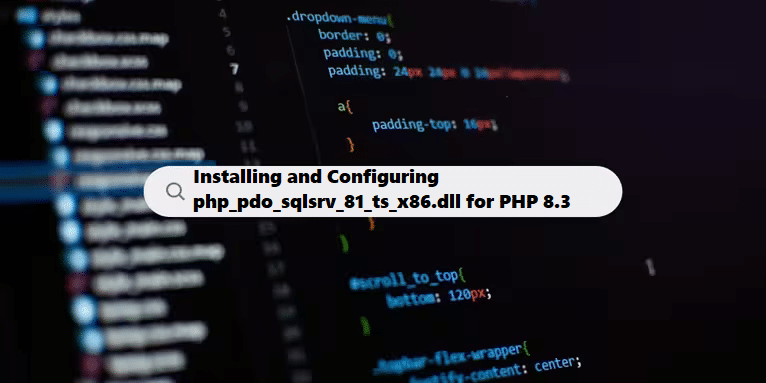To use the php_pdo_sqlsrv_81_ts_x86.dll extension with PHP 8.3, you’ll need to follow these steps:
- Download the SQLSRV Extension:
- Go to the Microsoft Drivers for PHP for SQL Server GitHub page.
- Look for the version compatible with PHP 8.3. As of your request, it may not be released yet, so ensure to check for the latest version.
- Install the Extension:
- After downloading, unzip the package and locate
php_pdo_sqlsrv_81_ts_x86.dll. - Copy this DLL file to your PHP extensions directory (commonly
extinside your PHP installation folder).
- After downloading, unzip the package and locate
- Edit php.ini:
- Open your
php.inifile (you can find its location by runningphpinfo()). - Add the following lines to enable the extension:
- Open your
#ini #php
extension=php_pdo_sqlsrv_81_ts_x86.dllIf you need additional features, you might also want to add:
#ini #php
extension=php_sqlsrv_81_ts_x86.dllVerify Installation:
- Restart your web server (e.g., Apache, Nginx) or PHP-FPM.
- Check your PHP configuration again using
phpinfo()to confirm the extension is loaded.
Testing:
- Create a simple PHP script to test the connection to your SQL Server database using PDO:
#php
<?php
try {
$pdo = new PDO("sqlsrv:server=your_server;database=your_database", "username", "password");
echo "Connection successful!";
} catch (PDOException $e) {
echo "Connection failed: " . $e->getMessage();
}
?>Make sure to replace your_server, your_database, username, and password with your actual database connection details.
If you run into issues, ensure that your PHP installation matches the architecture (x86 or x64) and thread safety (TS or NTS) of the DLL you’re using.
Improving Data Management with Coding Filters!
For developers dealing with large datasets, coding filters provide an effective way to manage data more efficiently. By applying filters to sort, validate, or transform data, developers can ensure that only the necessary data is processed, making applications faster and easier to maintain.




